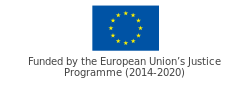
Microsite ProCam
Results
The main result of the project is the personal experience of domestic stakeholders gained through the experience exchange meeting. Through this, national stakeholders will have more knowledge on the practical consequences of recorded interrogations. The unique knowledge base on audiovisual recording of police interrogations of vulnerable persons will provide arguments to support policy changes. In particular:
(A) Information on international standards and academic research from across the EU;
(B) An up-to-date overview of the law and practice across the EU;
(C) In-depth understanding of the law and practice across 5 Member States, data on the extent of use of audiovisual recording of the interrogation of vulnerable persons in practice, costs, and the attitude of key stakeholders; and
(D) A unique opportunity for stakeholders of the participating countries to share their experience regarding audio-visually recorded interrogation of vulnerable persons. This method enables officials who do not use audiovisual recording to build trust towards this process.
Outputs
International Research
A desk review on international standards and global examples of good practice with an additional research carried out by the IJJO regarding children. This stage will involve surveys of LEAP and ECJJ to obtain an EU28-wide perspective on recording of interrogations. The LEAP research will outline the general picture while the ECJJ research focuses on the recording of the interrogation of children.
Domestic Research
Looking at the participating countries in terms of: (a) legal framework; (b) practical use of audiovisual recording of interrogation of vulnerable suspects and accused persons; (c) stakeholders’ attitudes to audiovisual recording; and (d) costs of existing practices.
The domestic research will comprise: (a) analysis of laws and jurisprudence, available statistical data and literature; (b) interviews with up to 10 stakeholders per country (including police officers, prosecutors, judges) and former vulnerable suspects or accused persons; and (c) freedom of information requests on the extent of audiovisual recording in practice and its costs.
Country Reports
Partners will produce template-based country reports containing: (a) an overview of the law and available statistical information; (b) an analysis of information gathered through the domestic research; and (c) an analysis of the factors facilitating and hindering the introduction of increased audiovisual recording of the interrogation of vulnerable persons and the corresponding risks which must be managed. Reports will contain examples of good practice, illustrative cases and concrete reform proposals.
Experience exchange meeting
Key actors from the Member States represented by the project partners will be invited including police officers, representatives of the prosecutor’s office and government officials in decision-making positions to share their experience and debate their concerns regarding the audiovisual recording of the interrogation of vulnerable suspects and accused persons.
The meeting will take place in France where the audiovisual recording of the interrogation of vulnerable suspects and accused persons is mandatory. The aim of the meeting is to allow the stakeholders of the Member States where audiovisual recording is not so widely used to address their concerns to the French officials and also to allow all officials to share their experience regarding audiovisual recording.
National stakeholders gathered at the experience exchange meeting will establish a network of cooperation between each other.
Comparative Study
With input from Partners, a major report will be produced on audiovisual recording, highlighting common themes and significant differences between EU countries. It will examine the relationship between audiovisual recording and the Directives and Recommendations as well as future work on judicial remedies. The Report will contain concrete reform proposals and examples of good practice.
Launch Event
Launching of the Report at a European Parliament event.
